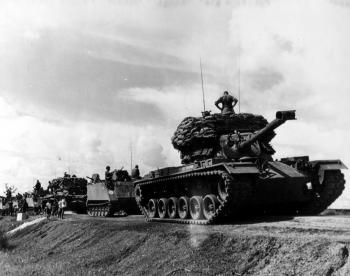World History is a broad topic that covers all events that have happened in the past in the entire world. The world can be split into continents or regions; this makes grouping and understanding history easier. Below are a few examples of major events that took place in the past in the regions of Asia, Africa, and South America.
Asia
1876-79 Chinese Famine:
Massive crop failures created famine conditions, and an estimated 9,000,000 people perished.¹
1976 Tangshan Earthquake:
A magnitude 7.5 earthquake struck east of Beijing. According to the Chinese government, 242,000 died, but the actual death toll may have been closer to 700,000.² 85 percent of buildings in Tangshan collapsed as a result of poor building planning and techniques.²
The Discovery of Gunpowder:
The discovery of gunpowder occurred around 850 CE during the Tang Dynasty in China.³ The discovery was an accident after an alchemist mixed ingredients together to try and lengthen a person's lifespan. Gunpowder was widely used by the Chinese for fireworks, but they also used the powder in military weapons against the Mongols.³
Africa
Human civilization began on the continent of Africa 3 to 5 million years ago.4 Around 8,000 BCE pottery and agricultural production was prevalent in the Nile Valley4. The Old Kingdom of Egypt emerged around 2,500 BCE when the pyramids were constructed of stone.4
In 850 BCE the Kushite Empire began to rise, and 300 years later the smelting of iron took place in Nigeria and central Niger.4
In the 1st and 3rd century CE, Christianity arrived in Northern Africa. Additionally, the crucifixion of Jesus Christ occurred in the early 1st century CE.4
In 1348 CE Black Death reached Maghreb from Sicily and killed over a quarter of the population of North Africa. In the 15th century, Portugal began to take slaves from Africa and missionaries arrived to convert the North African population.4
South America
Christopher Columbus arrived in Latin American in 1492 and this is when recorded history by the Europeans began. The Treaty of Tordesillas in 1493 was agreed upon by Portugal and Spain and outlined the distribution of new lands discovered in the Americas.5 Brazil was given to the Portuguese and the rest of the new world was given to the Spanish.5
Spain realized that the Incas and Aztecs needed to be defeated in order to fully exploit the resources available in the New World. A campaign of eradication began, and the Spanish exploited their superiority.
Much later, most of Latin America declared independence from Spain in 1810, while Spanish rule in the Americas completely ended in 1898.6
References:
1. http://afe.easia.columbia.edu/special/china_1750_demographic.htm
2. http://earthquake.usgs.gov/earthquakes/world/events/1976_07_27.php
3. http://www.livescience.com/7476-gunpowder-changed-world.html
4. http://arthistoryworlds.org/charting-major-events-in-africas-history-across-millenia/
5. http://www.britannica.com/EBchecked/topic/599856/Treaty-of-Tordesillas
6. http://www.slideshare.net/rknowles/latin-american-independence-movements

